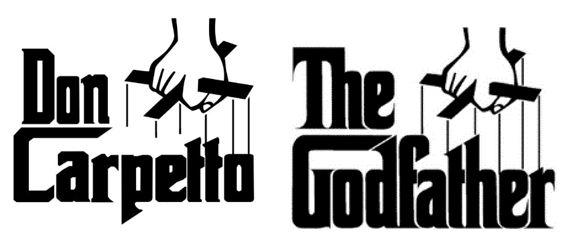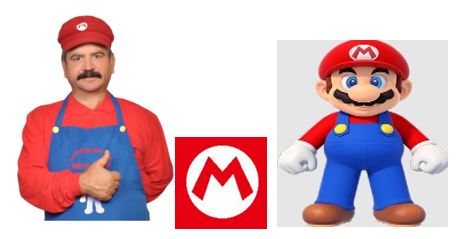The Turkish Patent and Trademark Office (PTO) has a broad approach and well-established praxis regarding the protection of copyright holders' rights on fictional works when characters, titles, and associated signs are used in third-party trademark applications. In its recent decision issued in April, the PTO accepted Paramount Pictures' opposition filed against the trademark application "Don Carpetto", as shown below, and rejected the registration of the contested application based on Paramount's copyrights in The Godfather movie, the distinctive typeface, and the marionette hand design in the well-known logo of the movie. The PTO also concluded that the applicant has dishonest intentions, and the contested trademark application was filed in bad faith.

The unauthorized use of entertainment works, titles, characters and associated signs thereof in third-party trademark applications is quite prevalent. People who wish to use copyrighted works should be aware that their usage are subject to the authorization of the copyright holders and unauthorized trademark applications can be prevented by the copyrights holders based on the provisions of the Intellectual Property Code numbered 6769 ("IP Code"). According to article 6/6 of the IP Code, a trademark application which contains name, tradename, photograph, copyright, or any other intellectual property right of a third-party can be refused based on an opposition filed by the right owner.
The PTO issued several other decisions where copyright holders' rights are protected against the third-party trademarks bearing signs identical/similar to the name and appearance of fictional characters, titles, logos, colors, and any other signs associated with movies, animated tv series, comics, cartoons, and platform games.
For instance, some other third-party trademark applications inspired from the famous movie, The Godfather, such as "The Grillfather", "The Dogfather", "Coco Black White", "Corleone Arms" and "Don Corleone Sicilia's", as shown below, were refused by the PTO based on Paramount's copyrights.

Characters and signs of the famous animated tv series, comics, and platform games such as SpongeBob SquarePants, Garfield and Super Mario have also been subject to various "creative" trademark applications infringing copyright holders' rights.
The trademark application "Mario the Fisherman", as shown below, which depicts a man having a moustache and wearing blue overalls, a red long-sleeve t-shirt and a red cap bearing an "M logo" just as the Super Mario character, was refused by the PTO upon Nintendo's opposition based on its copyrights on the Super Mario character.

The PTO also refused the trademark application "Spor Mario", as shown below, which imitates the distinctive typeface and colors used in the logo of the Super Mario platform game based on Nintendo's copyrights as per article 6/6 of the IP Code.

The trademark application "SüngerPub", as shown below, was refused by the PTO based on the copyrights of Viacom on the world-famous animated tv series SpongeBob SquarePants, character's name, appearance and the colors and other elements used in the logo such as the sponge-looking, porous structure used in the SpongeBob word and water drop shape in blue.

The trademark application "Mr. Garfield Cafe", as shown below, was rejected following Paws Incorporated's opposition based on its copyrights on the famous comic strips and the character, Garfield.

Copyrighted works are protected in Türkiye through the Law no. 5846 and as of the date of its creation without the registration requirement and the copyrights of foreigners are protected in the country through the Berne Convention as well. Therefore, in trademark opposition cases based on article 6/6 of the IP Code, opponents, i.e. copyright holders, do not have to submit copyright registration certificates obtained in Türkiye but can submit any other documents, such as copyright registration certificates obtained in other countries and/or documents regarding the creation of the relevant work would be helpful to prove the copyright holders' rights on the relevant work. It may also be helpful to rely on other grounds, if available, such as (i) bad faith of the applicant, (ii) likelihood of confusion if there is an earlier dated trademark for the relevant copyrighted work, for example a trademark for the appearance of the fictional character or the title of the copyrighted work and (iii) dilution due to well-known status of the trademark which includes the copyrighted work. In cases where a copyrighted work is imitated as per article 6/6 of the IP Code, the PTO usually finds claims based on bad faith of the applicant admissible as well, considering that the similarity of the contested application with the copyrighted work cannot be a mere coincidence and often accepts dilution claims when supported by evidence such as media coverage.
So, the copyright holders' rights are protected not only by the article 6/6 of the IP Code but also by other legal grounds available and the PTO's comprehensive approach and well-established practices with regard to the protection of copyright holders' rights ensure that the value of the copyrighted works is preserved at the trademark registry level.
First published by AIPPI Newsletter in Jun 21, 2024.
The content of this article is intended to provide a general guide to the subject matter. Specialist advice should be sought about your specific circumstances.



